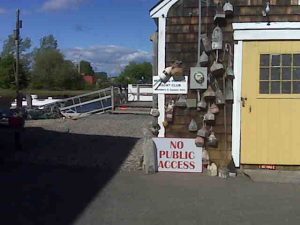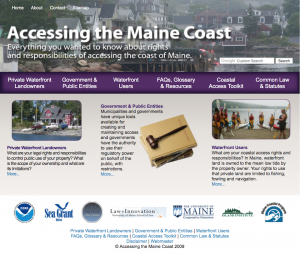Coastal Access and Working Waterfronts
 From hundreds of small fishing villages to several ports, Maine’s waterfronts are unique resources that offer social, cultural, economic, and environmental benefits. People need access to these waterfronts for different reasons; many depend on access to the waterfront to earn their living, including members of the fishing and aquaculture industries as well as those working in waterfront tourism and recreation such as kayak tour guides and fishing charters. These are known as “water-dependent” uses because they would not be possible without direct access to the waterfront. Other supporting uses, such as refrigeration facilities and marine servicing and fuel providers, are considered “water-related.” Still other uses don’t require access to the waterfront, but benefit greatly from a waterfront location, such as waterfront restaurants and lodging. These are considered “water-enhanced” uses. Maine New waterfront uses are emerging in Maine, such as transportation for offshore wind energy, and an increasing interest from institutions and researchers seeking access to the coast for their programs.
From hundreds of small fishing villages to several ports, Maine’s waterfronts are unique resources that offer social, cultural, economic, and environmental benefits. People need access to these waterfronts for different reasons; many depend on access to the waterfront to earn their living, including members of the fishing and aquaculture industries as well as those working in waterfront tourism and recreation such as kayak tour guides and fishing charters. These are known as “water-dependent” uses because they would not be possible without direct access to the waterfront. Other supporting uses, such as refrigeration facilities and marine servicing and fuel providers, are considered “water-related.” Still other uses don’t require access to the waterfront, but benefit greatly from a waterfront location, such as waterfront restaurants and lodging. These are considered “water-enhanced” uses. Maine New waterfront uses are emerging in Maine, such as transportation for offshore wind energy, and an increasing interest from institutions and researchers seeking access to the coast for their programs.
For each of these types of waterfront users, their desire for access is very real. However, the ways that they each use the waterfront may conflict with each other. For example, commercial fishing vessels may be trying to off-load their catch at a dock that is crowded with kayakers launching their boats. Or waterfront condominium owners may be frustrated by the noise of beach goers swimming in the surf in front of their homes.

At the same time, Maine’s waterfront infrastructure faces unique maintenance challenges, especially in light of rising sea levels and increasing flood and storm events.
Facilitating communication and cooperation among waterfront users with these diverse needs and interests has been a focus for Maine Sea Grant since 2003. In response to reported concerns of access conflicts, Maine Sea Grant works with partners to:
- Host forums designed to bring these diverse users together toward better understanding each other’s perspectives and developing cooperative solutions.
These forums highlight the value of Maine’s diverse waterfront, and identify challenges and solutions for coastal communities and businesses. The central goal is to share information and experiences, across industry and community stakeholders, about the tools and resources available to shape the future of Maine’s waterfront.- Partners have included: Bernstein Shur Attorneys, Coastal Enterprises, Inc., Island Institute, Maine Coast Heritage Trust, Maine Coastal Program, Maine Department of Revenue Services, Maine Working Waterfront Coalition, University of Maine Law School’s Center for Law and Innovation.
- View Materials from these workshops
- Build coalitions to address coastal access and working waterfront issues at the national level.
- National Working Waterfront and Waterways Symposium
Beginning in 2007, Maine Sea Grant has worked with partners across the country to design and implement this national conference to provide a forum for working waterfront practitioners to gather and learn from each other. Maine Sea Grant hosted the 2010 conference in Portland. - http://www.nationalworkingwaterfronts.com
- National Working Waterfront and Waterways Symposium
- National Working Waterfront
Maine Sea Grant is a founding member of this network which was created in 2013 to increases the capacity of coastal communities and stakeholders to make informed decisions, balance diverse uses, ensure access, and plan for the future of working waterfronts and waterways. With funding from the US Economic Development Agency, the Network has developed the Sustainable Working Waterfront Toolkit which presents financing, law and policy, economic, and historic trends data and analysis to guide working waterfront planning. Case studies and oral histories are also available to illustrate how tools have been used by practitioners. - Estimating Your Local Working Waterfront Economy
Members of the National Working Waterfront Network helped to clarify the need for local-level working waterfront economic information. This is needed to help communities estimate the value of their working waterfronts to help inform future planning. However, the relevant ocean economy data is only readily available at the national, state and county levels, making local-level estimation a challenge. To address this need, Maine Sea Grant works with economists at the National Oceanic and Atmospheric Administration’s Office of Coastal Management. This partnership has brought national level experts to work with Maine practitioners to develop methods and case studies specific to Maine, but for use as models for throughout the country.- Publications including a process guide, as well as methods and case studies are pending, and a pilot workshop conducted in Maine in 2017 will become a national-level training.
- Conduct research and share results to help communities make informed decisions related to coastal access and working waterfront planning.
- Public Shoreline Access in Maine 2016 is the third edition of this publication, providing the most recent legal updates to help individuals and communities understand coastal property law in Maine.
- Maine Sea Grant responds to community needs for information (presentations to municipal officials, planning commissions, citizens groups and nonprofits) and facilitates community discussions about access and working waterfront priorities.
- Access to the Waterfront: Issues and Solutions Across the Nation report characterizes the scope of changing waterfronts and coastal access issues nationally; inventories the diverse approaches implemented by Sea Grant programs to address the issues; and synthesizes all of the above into a compelling case-regarding the need for funding, policies and programs that address waterfront and access issues. Representative Chellie Pingree (D-ME) submitted this report as testimony when introducing H.R. 2548, Keep America’s Waterfronts Working Act.
- Accessing the Maine Coast website: addresses the need for information about legal mechanisms for addressing waterfront access issues. Maine Sea Grant received funding from the National Sea Grant Law Center to conduct research on new and existing legal tools, which was then made available to waterfront users, landowners, and government and public trust entities via Maine’s website. The website uses a Q&A format to address access and working waterfront needs faced by waterfront landowners, municipal and government officials, and waterfront users. It is also contains a robust resources section and a detailed glossary to help people navigate the legal framework of Maine’s waterfront-related policy. The website template has been adapted for use in six other states: Alabama, Florida, Hawai’i, Mississippi, New Jersey, and Virginia. Subsequent legal research has also produced an extensive body of work identifying a variety of tax policies that may be directed toward preserving working waterfronts.
- Publications including
- Moosabec: The Downeast Fishing Community of Beals and Jonesport, produced in partnership with the Washington County Council of Governments to promote understanding among newcomers and existing residents over traditional uses of land and water.
- Harpswell’s Working Waterfronts, produced in partnership with the Town of Harpswell and modeled on the Moosabec brochure.
